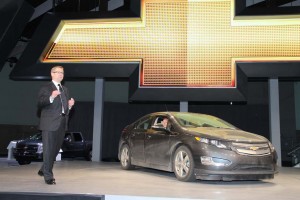In the latest in a series of surprise moves, General Motors has decided to boycott next January’s Super Bowl advertising extravaganza in protest over a huge increase in advertiser rates.
The decision follows word that the maker will also pull its ads off Facebook, the social media site that is today on its way to what could be the largest IPO in U.S. history. But insiders say GM is weighing more heavily than ever the perceived payoff for its estimated $4.5 billion ad budget, backing out of purchases that might deliver a halo but relatively little in terms of actual results.
“We continue to understand the value the Super Bowl provides,” said GM marketing spokesman Pat Morrissey, “but with the continued increase in price we just can’t justify it,” he said confirming a report in the Wall Street Journal itself attributed to the maker’s marketing czar Joel Ewanick.
The Super Bowl is considered not only the championship game for American football but the ultimate venue for advertisers – at least when it comes to “counting eyeballs,” in advertising parlance. The Nielsen Co. reported 111.3 million Americans watched the game in February of this year, making it the third consecutive year it set a record as the most-watched TV program in U.S. history. It was one of only four broadcasts to top 100 million viewers, a rarified list including the previous two championship games and the 1983 finale of TV series MASH.
But advertising rates have been rising faster than the actual viewership of the game, according to industry experts, reportedly reaching between $3.0 million to $3.2 million for a 30-second spot in February 2012. Sources told TheDetroitBureau.com that the figure is approaching $4 million for the game airing on CBS in 2013.
GM spokesman Morrissey would only say that the maker balked at what he described as a “pretty significant” increase for the planned broadcast of Super Bowl XLVII.
The maker’s boycott comes with a big asterisk, however. GM is only dropping out of “national advertising specific to the in-game” broadcast. In February of this year that included three 30-second spots and a longer, 1-minute commercial for the Chevrolet Silverado that was itself quite controversial.
(It aimed to suggest that after the apocalypse purportedly predicted in the Mayan calendar for late 2012 only the Chevy pickup will still be running. Ford Motor Co. threatened to sue to prevent the commercial’s airing, claiming industry data showed that maker’s F-Series model was more likely to survive the end of life, the universe and everything.)
But it appears GM might not be totally absent from the football festivities. It also ran several ads during the Super Bowl pre- and post-game TV coverage. And Morrissey acknowledged that it has not yet been decided whether to continue or drop those programs, as well.
GM previously pulled out of the 2009 Super Bowl due to the financial crisis that led to it filing for Chapter 11 bankruptcy protection that year.
The maker confirmed, earlier this week, that it will be ending its ad relationship with Facebook over the summer, Chevrolet marketing chief Chris Perry arguing the ads generated “insufficient” results. But GM has also said it will maintain an unpaid presence on the 900-million-member social media site.
The decisions to drop Facebook and now walk away from the Super Bowl aren’t coming as a huge surprise to Detroit-watchers who have seen big changes in the way the domestic makers have been operating over the last several years. Each of the Big Three has been looking for ways to break out as they struggle to reach potential buyers – especially those who have long ignored domestic products.
GM’s Ewanick has been especially aggressive, building a reputation as a game-changer since his arrival at the maker’s riverfront Detroit headquarters in May 2010. He has fired long-standing agencies, such as Chevy’s nearly eight-decade partner Campbell-Ewald, and more recently approved plans to consolidate a group of agencies to serve the brand on a global scale.
The former head of Hyundai marketing, Ewanick has promised to re-evaluate every aspect of the massive GM ad budget.
Among other things, it has long been a matter of debate just how well sports advertising pays off, but a well-placed media executive at one of Detroit’s largest ad agencies said that the regular run-up in pricing for the Super Bowl spots is simply “all about supply and demand.” Asking not to be identified by name because they didn’t have permission to talk to the media, the executive said, “The rates won’t come down as long as there’s someone who wants it.”
So, might GM’s decision to back out put downward pressure on CBS deal-makers? Not likely, said the advertising executive. “Somebody else will want (the ad slots).”

